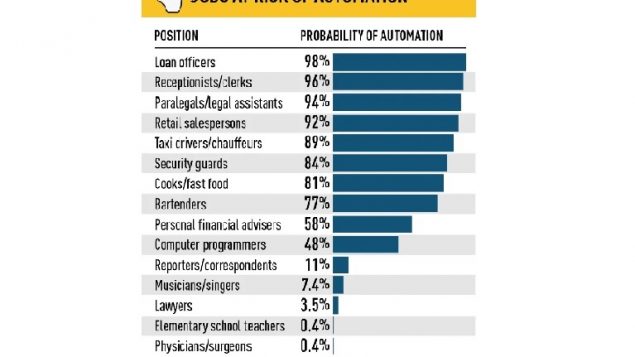A recent survey commissioned by the Ranstad Canada company echoes other surveys and information that automation and AI (artificial intelligence) could result in significant job loss.
The survey found that 30 per cent of women working in a wide variety of jobs and positions in Canada fear they will lose their jobs in the next ten years due to technology.

Self serve check outs are becoming increasingly common, and replacing the typical job of cashier (CBC)
Those in manufacturing have the greatest fear with 62 per cent fearing job loss. This is followed by women in IT at 29 per cent and retail workers fearing replacement by technology at 24 per cent.
Age a concern, not gender
The Ipsos Reid survey sampled 1,201 women aged 18+, composed of 1,100 employed women (working full-time, part-time or self-employed) and 101 women currently pursuing academic studies.
The women responded that they did not think future job loss was a gender issue, most (68%) feeling that men and women are at equal risk of job loss. However, they felt that age was a distinct disadvantage with 38 per cent of baby boomers being at greatest risk.
A majority (65%) feel employers have a responsibility to assist the employee replaced by technology through another position in the company and/or through retraining.

Autonomous giant mine trucks are now replacing drivers at sites in Chile, Australia, and now Canada PHOTO Komatsu
The estimation of substantial job losses from technology was mentioned by RSA (general insurance) in November 2017, when the CEO suggested that the property and casualty industry will change by between 30%-40% in the next five to ten years as technology replaces job categories or speeds up job function so that fewer people are needed.
In April of this year, another survey showed half of Canadian employers (49%) felt they would need fewer employees in just the next three years due to automation. Willis-Towers-Watson risk management firm produced the “Global Future of Work Survey” which involved over 900 companies worldwide including 49 in Canada.

graph- CBC News- Bloomberg
The survey found many firms (44%) are already taking action to “deconstruct” jobs and identify operations which can be automated.
The report notes that Canadian companies expect automation and AI to account for 17 per cent of work in the next three years compared to five per cent three years ago.
In an article in Forbes magazine, the author points out an important aspect as well, that unlike past technology changes, lost jobs will not be replaced by new jobs and suggesting there will be a massive net loss of jobs.
Additional information-sources







For reasons beyond our control, and for an undetermined period of time, our comment section is now closed. However, our social networks remain open to your contributions.